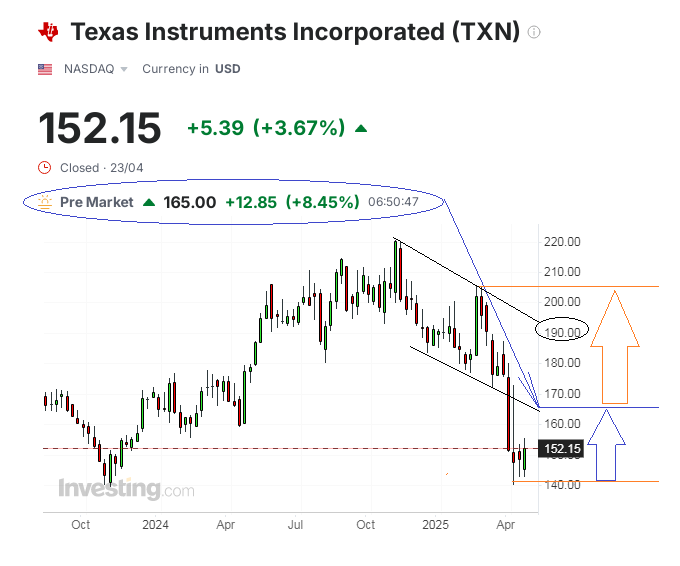Texas Instruments Is Out on a More Solid Ground
For the first time ever I am making a turning glance to this chipmaker, which didn't set the world alight unlike some others did. What led me to look over there, being rather excited with my find, was alleviating tariff concerns by the company, which predicted the current quarter's delivery well above estimates. Texas Instruments (TXN) has climbed as much as 8.5% in the pre-market trading on April 24 to touch $165 a share, with a bottom at $140 this April to follow its mid-February highs above $205, offering a nice reward/risk profile of 1.6:1. This is now a prominent ratio even for the attractive semiconductors equipment industry, with room for growth of approximately 25% upwards. Even the downtrend line readings, if plotted for the entire downward correction since early November 2024, are at almost $195 per share, which is about $30 per share from today's opening price.
When analysts pressed CEO Haviv Ilan on whether customers may be stockpiling chips ahead of higher levies barriers, his answer was "I would guess that at times like this, when there is a little bit of anxiety, do you want to have a little bit more inventory on your shelves?" He believes that customer inventories are "at low levels across all end markets" while "the industrial market increased upper single digits after seven consecutive quarters of sequential decline" and the automotive market also "increased low single digits" to offset mid-teens decline in the personal electronics segment. "We are in an up cycle... there is nothing I would call specifically versus Q1 other than the continued strength in industrial... The industrial signal is now, I would say, probably five months or so... I don’t see right now at least any slowdown there", Haviv Ilan, when answering a clarifying question. His business typically gets nearly a fifth of its total sales from China, so that it could be potentially exposed to tit-for-tat tariff battle between Beijing and Washington, but the company is relying on its fabrication facility based in China if needed, Ilan added. This may help Texas Instruments to properly address China's domestic demand in case of high import levies for US-rooted chips when brought in China.
With a market cap above $135 billion, Texas Instruments not only reported much better-than-expected earnings per share for the first three months of 2025, hitting $1.28 vs the average analyst estimate of $1.06 (i.e. beating forecast by 20.75%) on quarterly revenue reaching $4.1 billion instead of $3.91 billion in consensus opinion, but also projected its Q2 profit between $1.21 and $1.47, on revenue between $4.17 billion and $4.53 billion, compared with analyst pool’s $4.10 billion. The company's CEOs marked robust demand on analogue chips to keep a strong competitive position, including China's market, a moderate level of debt but strong liquidity with a current ratio of 4.12. During the earnings call, questions were raised, of course, to know more about potential tariff impacts and Texas Instruments’ potential of adjusting its supply chain because of this challenge, but the company's management reassured that flexible manufacturing allows quick adjustments to minimize immediate tariff damage, at least.
As Haviv Ilan said on Wednesday, they "spent some time looking at previous events, including the global financial crisis, and the COVID-19 pandemic... while no two scenarios are identical, these recent examples help inform our decisions as we prepare for a range of market scenarios", so that Texas Instruments "will adapt and succeed in a world that is ever changing". Well, as a very adoptable investor, I too will likely try to adapt and thrive in the rapidly changing market dynamics and will be willing to buy this stock happily if the high prices are sustained and not wasted by this week's close.

Disclaimer:
The comments, insights, and reviews posted in this section are solely the opinions and perspectives of authors and do not represent the views or endorsements of RHC Investments or its administrators, except if explicitly indicated. RHC Investments provides a platform for users to share their thoughts on financial market news, investing strategies, and related topics. However, we do not guarantee the accuracy, completeness, or reliability of any user-generated content.
Investment Risks and Advice:
Please be aware that all investment decisions involve risks, and the information shared on metadoro.com should not be considered as financial advice. Always conduct thorough research, seek professional advice, and exercise caution when making investment decisions.
Moderation and Monitoring:
While we strive to maintain a respectful and informative environment, we cannot endorse or verify the accuracy of all user-generated content. We reserve the right to moderate, edit, or remove any comments or posts that violate our community guidelines, infringe on intellectual property rights, or contain harmful content.
Content Ownership:
By submitting content to metadoro.com, users grant RHC Investments a non-exclusive, royalty-free license to use, display, and distribute the content. Users are responsible for ensuring they have the necessary rights to share the content they post.
Community Guidelines:
To maintain a positive and respectful community, users are expected to adhere to the community guidelines of Metadoro. Any content that is misleading, offensive, or violates applicable laws and regulations will be subject to moderation or removal.
Changes to Disclaimer:
We reserve the right to update, modify, or amend this disclaimer at any time. Users are encouraged to review this disclaimer periodically to stay informed about any changes.









